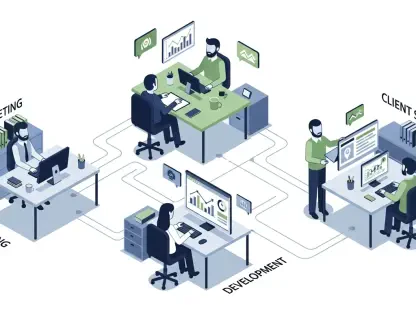In an era where the logistics industry faces mounting pressure to curb its environmental footprint, a groundbreaking initiative has emerged to tackle carbon emissions head-on at two of the UK’s busiest logistics hubs. With global supply chains contributing significantly to greenhouse gas emissions, innovative solutions are no longer optional but essential for sustainable growth. DP World, a prominent player in supply chain solutions, has stepped up with a pioneering effort at its London Gateway and Southampton facilities, aiming to transform how goods are transported. This program focuses on reducing the carbon intensity of trucking operations, a critical component of the logistics sector. By targeting thousands of daily truck visits, the initiative promises to make a measurable impact on emissions, aligning with broader industry goals of decarbonization. It represents a bold step toward a greener future, blending immediate action with a vision for long-term sustainability in an industry often criticized for its environmental impact.
Pioneering a Sustainable Logistics Future
Reducing Emissions with Alternative Fuels
At the heart of this transformative initiative is the adoption of low-carbon fuel alternatives for truck operators servicing DP World’s UK hubs in London Gateway and Southampton. The program introduces hydrotreated vegetable oil (HVO), a renewable fuel that offers up to 85% lower carbon intensity compared to conventional diesel. This shift is monumental, considering the high volume of over 4,000 truck visits daily at these sites. During a trial period extending to 2027, the goal is to support at least 500 trucks in transitioning to HVO, marking a significant reduction in emissions from heavy goods vehicles (HGVs). Collaboration with fuel providers ensures a steady supply of this alternative, making adoption feasible for trucking companies. This move not only addresses immediate environmental concerns but also sets a precedent for other logistics hubs to follow, demonstrating that scalable solutions can be implemented without disrupting operational efficiency in a demanding sector.
Industry Impact and Carbon Reduction Goals
The potential environmental benefits of this initiative are staggering, with estimates suggesting that full participation from trucking partners could slash over 30,000 tons of carbon dioxide emissions annually. This figure underscores the program’s role in tackling Scope 3 emissions, which encompass indirect emissions within a company’s value chain and are often the hardest to mitigate. Industry leaders have voiced strong support, recognizing the initiative as a vital step toward decarbonization in logistics. The focus on HVO serves as a practical interim solution while the industry works toward the ultimate goal of fully electric HGVs with zero tailpipe emissions. Such a transition reflects a pragmatic approach, balancing current technological limitations with ambitious sustainability targets. By aligning with broader trends of reducing carbon footprints, this effort highlights how targeted interventions in key areas of operation can yield substantial results for the environment and encourage wider industry adoption.
Building a Framework for Long-Term Change
Empowering Stakeholders Through Education
Beyond fuel transitions, a crucial element of this program lies in equipping stakeholders with the tools to embrace sustainability through education. A comprehensive, full-day carbon literacy training course is offered to truck operators and supply chain partners at the UK hubs. This face-to-face training delves into the challenges and opportunities of adopting greener practices, fostering a deeper understanding of carbon reduction strategies. By empowering participants with actionable knowledge, the initiative aims to cultivate a culture of environmental responsibility across the logistics sector. This educational component ensures that the shift to low-carbon fuels is not just a temporary fix but part of a broader mindset change. It addresses the often-overlooked human factor in sustainability, recognizing that informed decision-making at every level of the supply chain is essential for lasting impact and widespread acceptance of new practices.
Integrating Broader Sustainability Efforts
Complementing the educational push, the program ties into DP World’s wider sustainability framework, ensuring a holistic approach to reducing emissions. Initiatives such as the forthcoming driver welfare facility at Southampton and existing efforts like the Modal Shift and Carbon Inset Programs demonstrate a commitment to comprehensive change. Financial backing for the low-carbon truck initiative comes from the Energy Transition Contribution, a levy on import-laden containers at the company’s UK port facilities. This funding mechanism ensures the project’s viability without placing undue burden on operators. By weaving together fuel transitions, training, and infrastructure improvements, the initiative creates a robust ecosystem for sustainability. It also reflects an understanding that decarbonization requires multifaceted solutions, addressing not just technological barriers but also operational and cultural ones, paving the way for a smoother transition to a zero-emission future in logistics.
Reflecting on a Greener Path Forward
Lessons from a Collaborative Milestone
Looking back, the launch of this low-carbon truck initiative at DP World’s UK hubs stood as a testament to the power of collaboration between logistics providers, fuel suppliers, and industry associations. The integration of HVO as a transitional fuel marked a practical starting point, while the commitment to supporting hundreds of trucks during the trial phase showcased tangible progress. Partnerships with key stakeholders ensured that the program was not just a theoretical exercise but a real-world solution to pressing environmental challenges. The emphasis on reducing Scope 3 emissions through innovative means highlighted how targeted efforts could ripple across an entire supply chain, inspiring broader participation. This collaborative spirit, underpinned by a shared vision for sustainability, proved essential in overcoming initial hurdles and setting a benchmark for others in the sector to emulate in their own operations.
Charting the Next Steps for Logistics Sustainability
As the industry reflected on this initiative, the path ahead became clearer with a focus on scaling up from interim solutions like HVO to fully electric HGVs. Future considerations included expanding the program to more logistics hubs across the UK, leveraging lessons learned during the trial to refine implementation strategies. Strengthening educational outreach to include more stakeholders could further amplify impact, ensuring that sustainability becomes a core value in logistics operations. Additionally, continued investment in infrastructure, such as charging stations for electric vehicles, emerged as a priority to support the long-term vision of zero-emission transport. By building on the momentum of this program, the logistics sector could drive systemic change, turning ambitious goals into actionable outcomes. This initiative laid a foundation for a future where environmental stewardship and operational efficiency coexist, offering a model for others to adapt and innovate upon.









